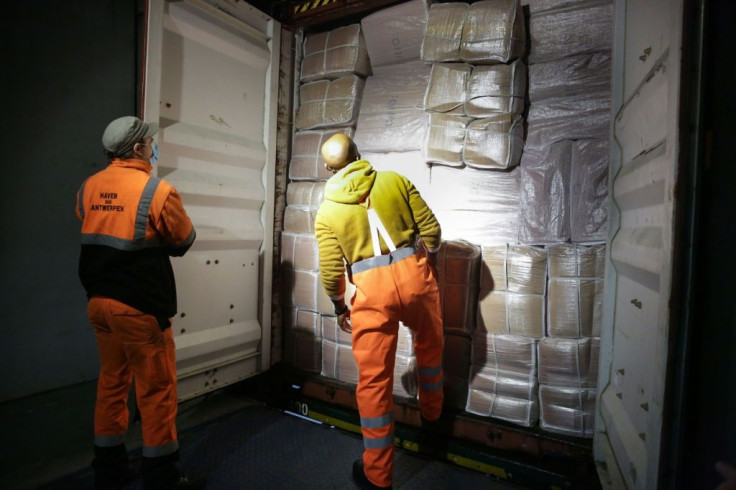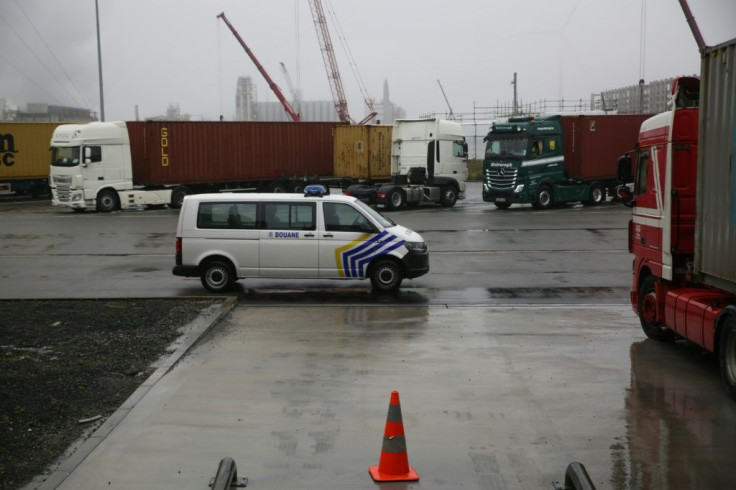Illicit Drug Trade At Belgian Port Fuels Crime Wave
Bomb explosions, shootings and even kidnapping of children: drug trafficking around Antwerp in northern Belgium is generating increasingly violent crime, which the authorities are struggling to tackle.
Antwerp is Europe's second largest goods port after Rotterdam, but is the number one gateway for cocaine to the continent, thanks to its closer trade links with South America.
The drug often arrives concealed in cargos of fruit or in the walls of shipping containers, mainly from Brazil, Ecuador and Colombia.
With almost 40 tonnes of cocaine seized by the end of September, 2020 is on course to beat the annual record of 61.8 tonnes.
To this figure should be added another 70 or so tonnes intercepted in Latin America on their way to Antwerp.
Even then, according to UN estimates, seizures represent only 10 percent of what enters the country, Kristian Vanderwaeren, Belgium's customs administrator general, told AFP.

On the street, a gram of cocaine sells for 50 euros, a mark-up on the import price which offers astronomical profits for the networks that control the trade.
And a parallel economy has rapidly developed to launder these profits, through luxury cars, small shops and real estate.
"Criminal money has infiltrated the city," says Vanderwaeren. On Antwerp's thousand kilometres of quays, "one can quickly earn 80,000 euros by recovering bags."
"Customs officers have already been convicted for working with criminal networks," he adds.
According to federal prosecutor Frederic Van Leeuw, the highest levels of society are now being targeted by traffickers looking for well-connected accomplices.
This week a former head of the gendarmerie and three policemen were arrested in a major investigation launched after a seizure of nearly three tonnes of cocaine in late 2019 in the northeastern province of Limburg.
Limburg, which borders Antwerp, has become a rear base for organised crime and "quick money", according to investigators.

Apart from cocaine, the province is also known to host secret laboratories producing synthetic drugs for gangs mainly based across the border in the Netherlands.
During the coronavirus lockdown in March and April, a 13-year-old was kidnapped and held for more than a month in the Limburg town of Genk because of his family's links with the drug scene.
Illegal drug dealing has led to "hostage-taking, torture, grenade attacks, Molotov cocktails, arson, shootings" according to Limburg public prosecutor Guido Vermeiren.
On Thursday, he and other high-ranking magistrates gathered at the Federal Prosecutor's Office to demand more resources from the government to tackle the problem.
The federal prosecutor compared drug trafficking to a cancer, criticising the infiltration of the economy by dirty money and the increasing danger of the general population getting caught up in gang violence.
This insecurity is particularly acute in certain neighbourhoods of Antwerp, where residents have been regularly woken up at night for more than two years by gunfire or grenades.
This has led the city to reinforce night-time police patrols since September.
In the district of Deurne, where he settled to study this violence, the Dutch anthropologist Teun Voeten shows a pharmacy window riddled with bullet holes following a shooting.
He says the building housing the shop was targeted because "its owner is known to have links with traffickers".
The message, he says, "maybe it was 'leave us alone, don't mess around'," -- a way of intimidating, of making people respect their territory.
"The big problem is that innocent people are also threatened or victims" of these attacks, says Wouter Bruyns, spokesman for the Antwerp police.
© Copyright AFP 2024. All rights reserved.





















